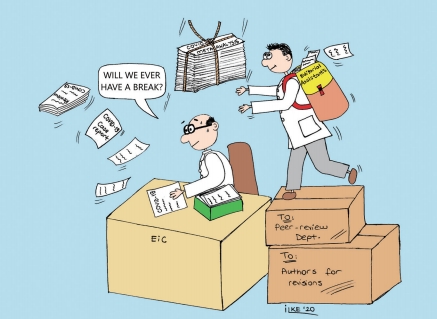Articles
- Page Path
- HOME > Sci Ed > Volume 8(1); 2021 > Article
-
Science Cartoon
The impact of the COVID-19 pandemic on science editing -
Ilke Coskun Benlidayi

-
Science Editing 2021;8(1):126-127.
DOI: https://doi.org/10.6087/kcse.241
Published online: February 20, 2021
Department of Physical Medicine and Rehabilitation, Cukurova University Faculty of Medicine, Adana, Turkey
- Correspondence to #Ilke Coskun Benlidayi icbenlidayi@hotmail.com
• Received: September 14, 2020 • Accepted: November 8, 2020
Copyright © 2021 Korean Council of Science Editors
This is an open access article distributed under the terms of the Creative Commons Attribution License (http://creativecommons.org/licenses/by/4.0/), which permits unrestricted use, distribution, and reproduction in any medium, provided the original work is properly cited.

-
Conflict of Interest
No potential conflict of interest relevant to this article was reported.
-
Funding
The author received no financial support for this case study.
Notes
- 1. Hofbauer LC, Rivadeneira F, Westendorf JJ, Civitelli R. Scientific editing in the COVID-19 era: personal vignettes from the JBMR editors. J Bone Miner Res 2020;35:1005-8.https://doi.org/10.1002/jbmr.4050. ArticlePubMed
- 2. Gasparyan AY, Nurmashev B, Seksenbayev B, Trukhachev VI, Kostyukova EI, Kitas GD. Plagiarism in the context of education and evolving detection strategies. J Korean Med Sci 2017;32:1220-7.https://doi.org/10.3346/jkms.2017.38.1220. ArticlePubMedPMC
- 3. Ahima RS, Jackson S, Casadevall A, et al. Changing the editorial process at JCI and JCI insight in response to the COVID-19 pandemic. J Clin Invest 2020;130:2147. https://doi.org/10.1172/JCI138305. ArticlePubMedPMC
- 4. Eisen MB, Akhmanova A, Behrens TE, Weigel D. Publishing in the time of COVID-19. Elife 2020;9:e57162. https://doi.org/10.7554/eLife.57162. ArticlePubMedPMC
- 5. Bazdaric K, Smart P. ESE and EASE call for high standards of research and editing. Eur Sci Ed 2020;46:e53230. https://doi.org/10.3897/ese.2020.e53230. Article
References
Figure & Data
References
Citations
Citations to this article as recorded by 

- QUALITY PEER REVIEW IS ESSENTIAL FOR SCHOLARLY PUBLISHING
Ilke Coskun Benlidayi
Central Asian Journal of Medical Hypotheses and Ethics.2022; 3(1): 79. CrossRef - MAY AUTHORS’ PUBLISHED ARTICLES LAST FOREVER!
Ilke Coskun Benlidayi
Central Asian Journal of Medical Hypotheses and Ethics.2022; 3(2): 138. CrossRef - ONLINE MEETINGS DURING THE ERA OF THE COVID-19 PANDEMIC
Ilke Coskun Benlidayi
Central Asian Journal of Medical Hypotheses and Ethics.2021; 2(3): 170. CrossRef

 KCSE
KCSE
 PubReader
PubReader ePub Link
ePub Link Cite
Cite

